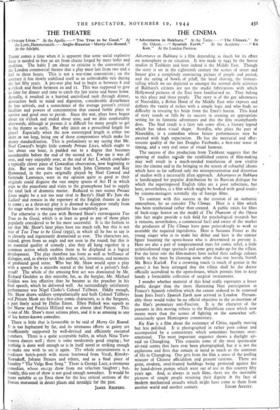THE THEATRE 4 , Private Lives." At the Apollo.—" Too True
to be Good." At the Lyric, Hammersmith.—Anglo-Russian " Merry-Go-Round." At the Adelphi.
THERE comes a time when it is apparent that some social explosive force is needed to free an art from chains forged by mere habit and tradition. The habit I am about to criticise is the convention of the London commercial theatre that a play must last from two and a half to three hours. This is not a war-time convention • on the contrary it has slowly stabilised itself as an unbreakable rule during the last fifty years. A pre-war play had to begin at between 8 and 9 o'clock and finish between to and it. This was supposed to give us time for dinner and time to catch the last trains and buses home. Actually, it resulted in a hurried uncivilised rush through dinner, destructive both to mind and digestion, considerable disturbance by late arrivals, and a somnolence of the average person's critical faculties and powers of concentration that caused feeble plays to survive and good ones to perish. Since the war, plays have begun about six o'clock and ended about nine, and we dine comfortably afterwards, although at present-it is difficult for many people to get to the theatre so early. But why insist on a prescribed length for plays? Especially when the now stereotyped length is either too short or too long, being one of those compromises which make for dreary standardisation. This is preliminary to my saying that Mr. Noel Coward's bright little comedy Private Lives, which ought to last about one hour, is padded out to a degree that becomes unendurable before the end of the second act. For me it was all over, and very enjoyably over, at the end of Act I, which concludes a typically clever piece of Cowardian observation, now beginning to date. But not even the fact that both John Clements and Kay Hammond, in the parts originally played by Noel Coward and Gertrude Lawrence, were in my opinion quite as good as their originals could disguise the vast empty spaces of Act II in which trips to the pianoforte and visits to the gramophone had to supply the total lack of dramatic matter. Reduced to two scenes Private Lives might be a not too near rival to Barrie's Shall We Join the Ladies? and remain in the repertory of the English theatre in days to come ; as a three-act play it is doomed to disappear totally from the stage when its waning topicality has completely gone.
Far otherwise is the case with Bernard Shaw's extravaganza Too True to be Good, which is at least as good as any of those plays popularly considered to be his most successful. It is the fashion to say that Mr. Shaw's later plays have too much talk, but this is not true of Too True to be Good (1932), in which all he has to say is as cleverly and ingeniously dramatised as ever. The characters are, indeed, given from an angle and not seen in the round, but this is an essential quality of comedy; also they all hang together in a common action which enables them to be displayed in a logical development. The play therefore has form as well as brilliance of dialogue, and, as always with this author, wit, invention, and moments of profound good sense. Who but Mr. Shaw would open a play with a speech by a microbe seated at the head of a patient's bed- stead? The whole of the amusing first act was dominated by Mr. Richard Goolden as this microbe, for, as the burglar, Mr. Michael Golden was less effective than he became as the preacher in his final speech, which he delivered well. An outstandingly satisfactory performance was Nigel Clarke's Colonel Tallboys. Oddly enough, Mr. Shaw draws soldiers sympathetically and both Colonel Tallboys and Private Meek are first-class comic characters, as is the Sergeant, a part finely acted by Dallas Eaton. Ellen Pollock was superb as the Nurse and Patricia Hilliard was an almost ideal Patient. This is one of Mr. Shaw's most serious plays, and it is as amusing as any of his better-known comedies.
There is little that is favourable to be said of Merry Go Round. It is too haphazard by far, and its strenuous efforts at gaiety are insufficiently supported by well-devised and efficiently executed mimbers. There is a quite acceptable ballet, in which Nina Tara- kanova dances well ; there is some moderately good singing ; but nothing is done well enough or is in itself novel or striking enough to make one wish to see it again. The whole entertainment is a mediocre hotch-potch with music borrowed from Verdi, Rimsky- Korsakoff, Johann Strauss and others, and as a final piece of banality " The Volga Boat Song." There is George Lacy, a strenuous comedian, whose enagy drew from me reluctant -laughter ' • but, frankly, this sort of show is not good enough nowadays. It would be more suitable as an Ensa show for the less critical sections of the Forces marooned in desert places and nostalgic for the past JAMES REDFERN.


























 Previous page
Previous page